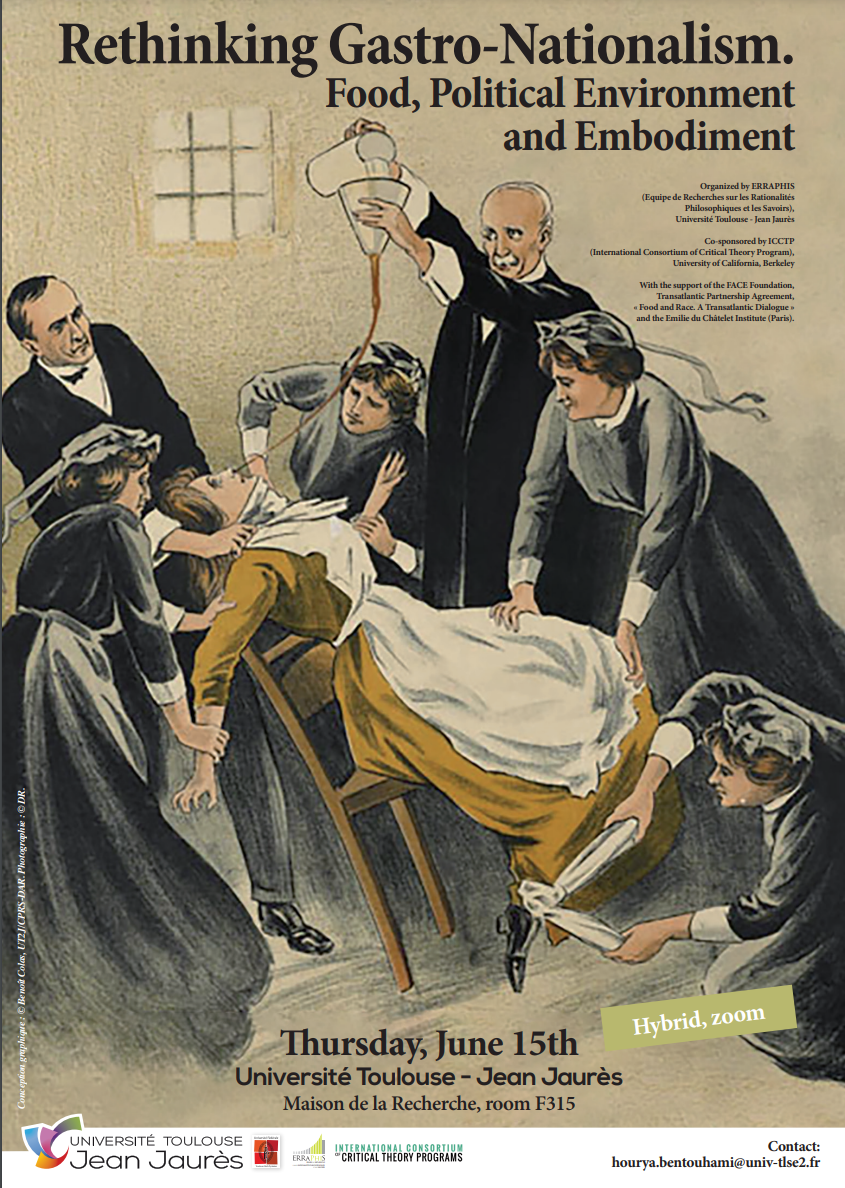- Colloques,
- Recherche,
-
Partager cette page
Rethinking Gastro-Nationalism. Food, Political Environment and Embodiment

Thursday, June 15th Hybrid, zoom/ room F315, Maison de la Recherche, Université de Toulouse Jean Jaurès
Rethinking Gastro-Nationalism.
Food, Political Environment and Embodiment
Thursday, June 15th
Hybrid, zoom/ room F315, Maison de la Recherche, Université de Toulouse Jean Jaurès
Organized by ERRAPHIS (Equipe de Recherches sur les Rationalités Philosophiques et les Savoirs), Université Toulouse Jean Jaurès
Co-sponsored by ICCTP (International Consortium of Critical Theory Program), University of California, Berkeley
With the support of the FACE Foundation, Transatlantic Partnership Agreement, « Food and Race. A Transatlantic Dialogue » and the Emilie du Châtelet Institute (Paris).
The notion of gastronationalism (De Soucey) has had considerable success in the field of food studies in sociology and social history in relation to the construction of a food fetishism representative of a national and geographical identity. This formula refers to the labeling process by which a product is elevated to gastronomic rank, representative of the culture and nature of a country, of its nationality; which contributes to arouse an emotional attachment to the tasting of this product. However, the idea of this workshop is to complete this approach by reconsidering the physiological materiality of the processes of attachment and ingestion, by taking seriously the conversion specific to human metabolism which operates from the belly, understood from the metabolic functions of the stomach, the intestine, the pancreas and the liver: is it because eating, and more precisely digesting, is understood as a process of conversion into oneself of an organic exteriority from an interior laboratory, that fantasies around the trouble of the permanence of identity (including collective and national) could be expressed from this bio-medical knowledge?
It is to the treatment of the ambivalence of this question that this workshop will be devoted by paying attention to the complexity of the socio-historical formations in which are elaborated the bio-medical knowledge and the nutritional policies with regard to target populations. While feminist and race-critical theorizations have already analyzed the reproductive functions of women's wombs, this study day will analyze what of the gastric, digestive and metabolic function of the womb is object of particular attention in discourses with a biopolitical vocation, that is to say those that support the maximization of life through policies of care, nutrition and public hygiene articulated explicitly or not, to discourses of the nation, of the population understood as a people. What about the stomach, the liver, the pancreas thus thought of since their metabolic operations tells us something about the production of racial, sexual or gender pathologies, of morbidity linked to the racialization and sexuation of subjects thus studied and targeted?
We will also seek to understand how inequalities in care and/or epistemic violence are put in place in the application of dietary recommendations to maintain and/or maximize health, but also in the theoretical approach to understanding the functioning of the metabolic devices that can be made from anthropological biases. At the intersection between medical history, philosophy of bio-medical sciences and social and political philosophy, this transdisciplinary workshop will seek to shed light from the irruption of the metabolic paradigm in biomedical sciences in the 19th century to our post-genomic era, on the articulation between public health policies, struggles against racism and sexism, in order to show the ambivalence of the construction and uses of the metabolic paradigm in the bio-medical sciences and more generally in the political imagination.
Schedule
1 pm. Introduction of the workshop by Hourya Bentouhami and brief presentation of the FACE Foundation « Food and Race » program
1.10 pm. Mathilde Cohen, Professor of Law, University of Connecticut (United-States), co-PI « Food and Race. A Transatlantic Dialogue » (FACE Foundation)
Food Identity in US Law
Commentator : Sarah Bak-Geller Corona, Professor of anthropology, Universidad Nacional Autonoma de Mexico
2 pm. Salim Al-Gailani, Associate Professor in History of Modern Medicine, Department of History and Philosophy of Science, University of Cambridge
Folic Acid on Trial: Vitamins, Pregnancy, and the Making of a Technology of Public Health
Commentator : Cécilia Bognon Küss, Postdoctoral fellow in philosophy of science and history of medicine, Université Paris-Cité, program « Who Am I ? » (France)
2.50 pm. Julie Jarty, Associate professor of sociology, Université Toulouse-Jean Jaurès
“Eat for two”, a dead and buried adage. A transnational comparison of (the whiteness of) pregnancy and motherhood regimes
Commentator : Sarah Werner Boada, Marie-Curie Postdoctoral Fellow, University of Warwick (United-Kingdom)
3.40 pm. pause
4 pm. Ian Miller, Senior lecturer in medical history, Ulster University (United-Kingdom)
The Idea of the National Stomach: Britain and Ireland, c.1800-1920
Commentator : Tripp Rebrovick, Coach of debate, Harvard University
4.50 pm. Hourya Bentouhami, Associate professor of political philosophy, Université of Toulouse Jean-Jaurès, ERRAPHIS (research center on philosophical rationalities and knowledge)
Metabolism, Social Reproduction and Nationalism
Commentator : Gabriele Proglio, Associate professor of contemporary history, University of Gastronomic Sciences, Pollenzo (Italy)
contact: hourya.bentouhami@univ-tlse2.fr
